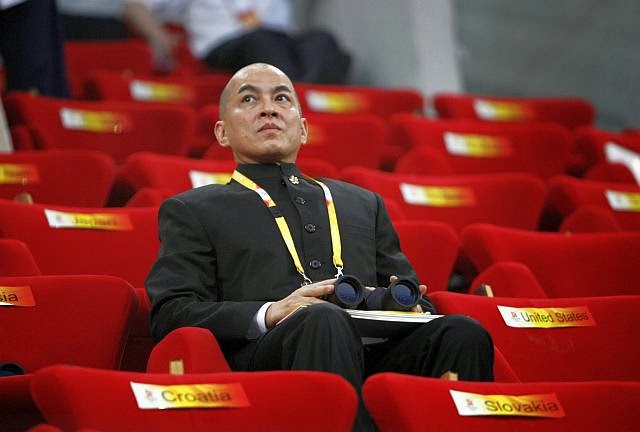Olympic games have been glamorous events ever since they began in
776 BC. After the Roman Emperor Theodosius banned the games as “pagan religious
festival” in 393 AD, the summer Olympic games began anew in modern times 1894,
Athens. Rulers of host countries try their best to capitalise on the games and
try their best to be seen in a desirable manner.
Sometimes fate intervenes and it can be a national disaster like
host Russia loosing to Finland in Ice-Hockey in 2014 Sochi.
or “Aryan” German athletes losing to a Black American Jesse Owens in
Munich 1936.
Sometimes there may be other reasons for the ruler to be unhappy;
e.g. being tired, ill or feeling that she has better things to do:
Rulers can be rather lonely at the Olympics. With no one to share emotions with, this can be very
stressful. Cambodia's
King Norodom Sihamoni attends the opening ceremony of the Beijing 2008 Olympic
Games at the National Stadium, August 8, 2008.
It wasn’t always like this. A very
long time ago “Rulers” were treated a bit more mercifully.
Photo shows (left to right)
Prince Wilhelm of Sweden and Norway (1884-1965), Duke of Södermanland; Crown
Prince Gustav VI Adolf of Sweden (1882-1973) with their father King Gustav V at
the 1912 Summer Olympic Games in Stockholm, Sweden – all being very
aristocratic and restrained. Photo source:
In those days, royals and other demigods were usually portrayed in
full regalia and looking their best only as they dutifully served the nation as George VI at the London Olympics in 1948.
The Japanese Emperor Shōwa with the Empress Kojun at the Olympics Games in
Tokyo 1964 behaving with the imperial manner and dignified grace expected of
them.
Sometimes tragedy strikes at the Olympic Games. West German
Chancellor Willy Brandt in the Munich Olympics of 1976, looking very distressed
after the Palestinian terrorist group Black September had killed 11 Israeli
athletes and one West German Police officer.
Leaders like Soviet Union’s Brezhnev in the Moscow summer Olympics
of 1980 continued this sombre grimness in their public appearances.
Now, there was another side to Brezhnev, which helped 265 million
people endure the Soviet system in all its grimness. Here is a couple of those
delightful jokes:
At the 1980 Olympics, Brezhnev begins his speech."O!" — applause. "O!" — more applause. "O!" — yet more applause. "O!" — an ovation. "O!!!" — the whole audience stands up and applauds.An aide comes running to the podium and whispers, "Leonid Ilyich, that's the Olympic rings, you don't need to read it!"
Brezhnev and Napoleon meet in the next world.`Oh-h-h, if only we'd had such a brilliant commander as yourself in the Soviet Union instead of Stalin,' Brezhnev says to Napoleon, `then we wouldn't have allowed Hitler to cross our threshold.'`And if I had newspapers like your Pravda,' says Napoleon, `not a soul would have heard about Waterloo.' Source:
Chinese President Hu Jintao in Beijing 2008, happily witnessing the great glory of his
people.
Chinese President Xi Jinping at
the opening ceremony of the 22nd Winter Olympic Games in Sochi, Russia, Feb. 7,
2014. In both photos everyone is smiling and clapping happily while expressing
well-rehearsed behaviour.
But nowadays many leaders have to utilise the photo ops best by
themselves and take “selfies”:
Being seen with the right people
is very important. It’s actually one of the things which get people to the top in
the first place.
Fortunately, nowadays Heads-of-States
can be seen having fun or enjoying sports like anyone else.
King Carl Gustav XII and Queen Silvia attend the women's Olympic curling gold medal game between Canada and Sweden at the Vancouver Olympic Centre on Day 15 of the 2010 Winter Olympic Games in Vancouver February 26, 2010. Photo source:
Sometimes they might have a tiff
about the results or the other one's public behaviour:
Sometimes things really begin to
go wrong and one just needs to yell.
President George W Bush is an all
time favourite when it comes to humour (at his expense). So here’s the Brezhnev
of USA at it.
But it seems that even he can be
bored, in suitable company.
In place of 265 million citizens
of his own country, as in the case of Brezhnev, it’s American talk-show hosts
who are trying to be funny about Russia’s President Vladimir Putin. Here are
some examples:
- "Today, the Olympic torch arrived in Sochi. But Vladimir Putin immediately put it out because he thought it was too flaming." –Conan O'Brien
- "Organizers for the Sochi Olympics have had trouble filling seats for the biathlon. This is because Vladimir Putin is warning people away from any event containing 'bi.'" –Conan O'Brien
- "On Friday, Russian President Vladimir Putin said gay people at the Olympics should not fear for their safety despite the country's anti-gay laws. He said they should fear for their safety because they're in Russia." –Jimmy Fallon
But, Russians are still the best
when it comes to humour about their own ruler. This Russian one going around in
Russia is wonderful:
Putin’s stare penetrates a ten-foot lead wall and brings a kettle to a boil within 10 seconds from three miles away. For public safety he must wear special contact lenses at all times. Source:































